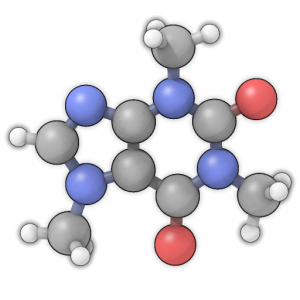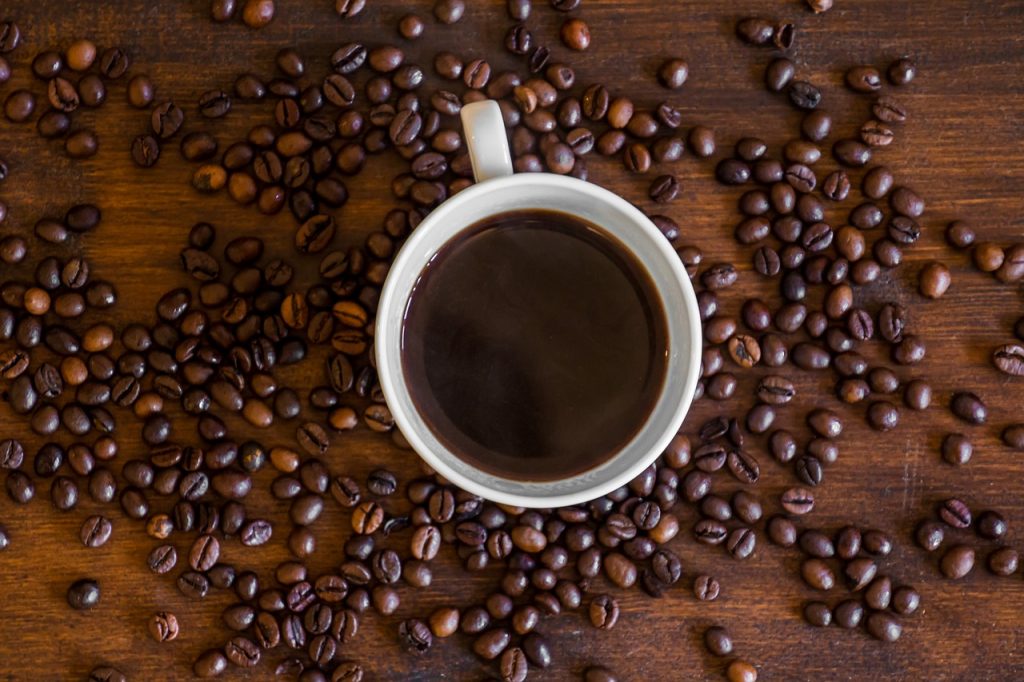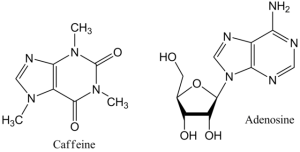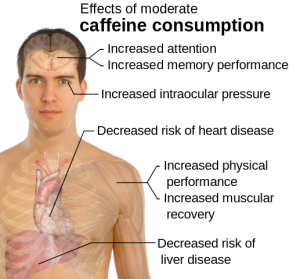Caffeine boosts both physical & mental energy and related cognitive aspects such as mood and focus.

- Blocking adenosine. This biological mechanism results in increased energy levels and improved mood, attention, and overall cognition.
Overview
Caffeine (1,3,7-trimethylxanthine) is the most widely-consumed psychoactive substance in the world, taken by billions of people in the form of coffee, tea, and soft drinks. Known primarily as a central nervous system stimulant, caffeine increases energy, focus, wakefulness, improves mood, and decreases the perception of fatigue.
Coupled with its incredible safety record, these effects have made caffeine the prime choice for both recreational use and enhancing physical and mental performance.
In addition, caffeine is frequently added to medical preparations and supplements, and has been shown to provide beneficial effects for a wide range of health conditions including Alzheimer’s, depression, diabetes, obesity, asthma, and liver conditions.
The use of caffeine for boosting energy – as measured by improvements in alertness, concentration, mood, creativity, self-confidence, exercise performance, and reductions of sleepiness and fatigue – is backed by decades of successful research and thousands of years’ worth of use.

How Caffeine Might Help With Energy
Caffeine is absorbed into the bloodstream within 45 minutes of being taken, and easily crosses the blood-brain barrier.
Blocking adenosine receptors

- Increasing the levels or signaling of several neurotransmitters that promote well-being, alertness, and feelings of increased energy, including dopamine, serotonin, acetylcholine, norepinephrine and glutamate
- Promoting epinephrine (adrenaline) release, causing further stimulating effects such as increased heartbeat, blood pressure, sugar release for energy
Caffeine Uses & Benefits for Energy
Caffeine is highly popular for increasing physical and mental energy. Although there is no standardized, scientific way for defining and measuring changes in energy, caffeine has been consistently demonstrated to result in effects associated with improved energy, namely:

- Decreased sleepiness/improved wakefulness
- Improved alertness, focus, attention, and other cognitive parameters
- Enhanced well-being and mood
- Decreased perception of fatigue
And far from only affecting improving mental performance, caffeine has also been demonstrated to boost physical energy, resulting in benefits such as increased time until exhaustion and better time trial performance during endurance activity, and improved high-intensity sports (soccer, field hockey, rowing, and others) performance. 3
Research
Human Research
Decades of clinical studies provide plenty of evidence for the stimulating effects of caffeine that aid both cognitive and physical energy.
Caffeine reduces fatigue while improving vigor and attention regardless of age/gender
This double-blind, placebo controlled, crossover study examined whether the effects of caffeine were age or gender-specific. Twelve participants aged 18-30 and 12 others over 60 years old were given placebo or 64/128/256 mg doses of caffeine on separate occasions. Caffeine resulted in improved measures of vigor, fatigue, and performance in the Wilkinson Auditory Vigilance (attention/alertness) Test.
- The researchers concluded that “performance and mood enhancing effects of caffeine are neither age nor gender specific.”4
Caffeine reduces perceived exertion and improves performance during exercise
In this frequently-cited meta-analysis paper, researchers reviewed 21 studies that examined the effect of caffeine on rating of perceived exertion (RPE)—a way of measuring how much an individual feels their body is working during physical activity. They found on average, caffeine reduced RPE by 5.6% and improved exercise performance by 11.2% compared.
- The authors concluded that “The results have quantified the suggestions in the literature that caffeine reduces RPE obtained during exercise. Moreover, there is evidence that the reduction in RPE may partly explain the ergogenic effects of caffeine.”5
In this randomized, double-blind, placebo-controlled study, the effects of 40 mg caffeine (in coffee, water, tea, or cola) on mood and cognitive function were tested in 144 participants. Compared to placebo, all caffeine groups reported improved alertness and performance on attention and memory tests, regardless of the drink used.
- The researchers concluded that “a dose of caffeine typical of the level found in commercial products can improve alertness and performance efficiency.“6
Caffeine reverses the effects of sleep deprivation on mood and attention
This double-blind, placebo-controlled trial examined the effects of caffeine in sleep-deprived individuals. A total of 50 men didn’t sleep for 49 hours and were then given placebo or 150/300/600 mg doses of caffeine. Caffeine reversed the sleep deprivation-caused changes in ratings of vigor, fatigue, and confusion, and promoted wakefulness.
- The researchers concluded that “caffeine was able to produce significant alerting and long-lasting beneficial mood effects in individuals deprived of sleep for 48 h.“7
Caffeine (250 mg) promotes alertness and increased energy in older adults
This double-blind, placebo-controlled crossover study tested the effects of caffeine and theophylline (a compound similar to caffeine) in older adults. The participants tried both compounds and placebo on three separate occasions, and rated feeling much more alert and energetic only on caffeine.
- The researchers concluded that “caffeine is a more potent CNS stimulant than theophylline.“8
Caffeine (250 mg) improves alertness and concentration
This double-blind, placebo-controlled study examined the effects of caffeine on alertness. A total of 24 young men were given placebo or caffeine (250 mg) 2 times daily for 2 days. Caffeine was demonstrated to improve alertness and auditory concentration.
- The researchers concluded that “caffeine clearly improves both alertness and vigilance performance as objectively measured.”9
This double-blind, placebo-controlled trial tested the cognitive effects of caffeine. Seven participants abstained from caffeine, and were then given two capsules in a sequence, one containing caffeine (10 – 178 mg) and the other placebo. They then attempted to guess which capsules contained the caffeine. All seven participants correctly identified the 100 and 178 mg doses of caffeine, and consumption of 100 mg of caffeine increased ratings of alertness, well-being, motivation, concentration, energy, confidence, and decreased sleepiness.
- The researchers concluded that “The present study documents biological activity of caffeine at lower doses than heretofore recognized.“10
Dosage for Energy
- Most successful research studies of caffeine’s effects on energy and related benefits use 100 – 250 mg doses
- Studies looking particularly at physical performance recommend caffeine doses of 3 – 6 mg/kg body weight
- Caffeine supplements usually come in 200 mg capsules
- Caffeine is frequently combined with other energy/cognition-boosting ingredients such as theanine
- Taking 500 mg or more is not recommended as these doses vastly increase the likelihood of side effects such as anxiety, tension, and heart palpitations
- For physical performance, caffeine taken in pure supplement form seems to be more effective than coffee
- Coffee contains an average of 138 mg caffeine per cup, compared to 47 mg for tea
Supplements in Review Says
- Caffeine 100-200 mg for energy.
Caffeine is the most popular choice for boosting energy. The combination of safety and efficacy makes caffeine far and away the best supplement for improving energy levels.
200 mg is the standard dose. Although the most used and arguably most effective dose of caffeine is 200 mg, it’s always better to start out with a lower dose (100 mg) to see how you respond and assess possible side effects, especially if you don’t regularly consume caffeine-containing beverages.
Leave a Reply